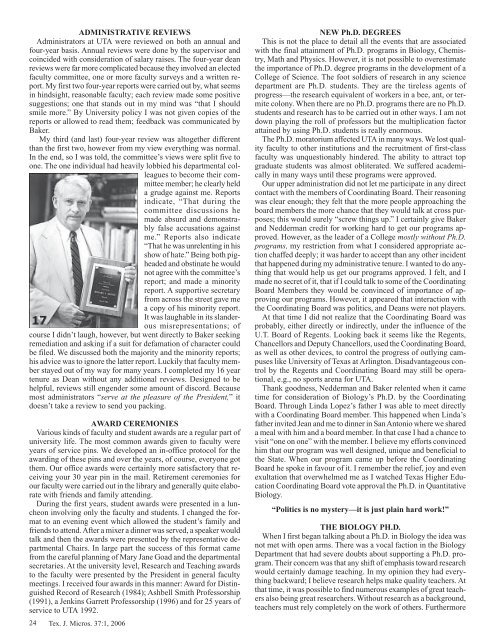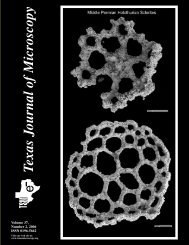Texas Journal of Microscopy Texas Journal of Microscopy
Texas Journal of Microscopy Texas Journal of Microscopy
Texas Journal of Microscopy Texas Journal of Microscopy
You also want an ePaper? Increase the reach of your titles
YUMPU automatically turns print PDFs into web optimized ePapers that Google loves.
ADMINISTRATIVE REVIEWS<br />
Administrators at UTA were reviewed on both an annual and<br />
four-year basis. Annual reviews were done by the supervisor and<br />
coincided with consideration <strong>of</strong> salary raises. The four-year dean<br />
reviews were far more complicated because they involved an elected<br />
faculty committee, one or more faculty surveys and a written report.<br />
My first two four-year reports were carried out by, what seems<br />
in hindsight, reasonable faculty; each review made some positive<br />
suggestions; one that stands out in my mind was “that I should<br />
smile more.” By University policy I was not given copies <strong>of</strong> the<br />
reports or allowed to read them; feedback was communicated by<br />
Baker.<br />
My third (and last) four-year review was altogether different<br />
than the first two, however from my view everything was normal.<br />
In the end, so I was told, the committee’s views were split five to<br />
one. The one individual had heavily lobbied his departmental colleagues<br />
to become their committee<br />
member; he clearly held<br />
a grudge against me. Reports<br />
indicate, “That during the<br />
committee discussions he<br />
made absurd and demonstrably<br />
false accusations against<br />
me.” Reports also indicate<br />
“That he was unrelenting in his<br />
show <strong>of</strong> hate.” Being both pigheaded<br />
and obstinate he would<br />
not agree with the committee’s<br />
report; and made a minority<br />
report. A supportive secretary<br />
from across the street gave me<br />
a copy <strong>of</strong> his minority report.<br />
It was laughable in its slanderous<br />
misrepresentations; <strong>of</strong><br />
course I didn’t laugh, however, but went directly to Baker seeking<br />
remediation and asking if a suit for defamation <strong>of</strong> character could<br />
be filed. We discussed both the majority and the minority reports;<br />
his advice was to ignore the latter report. Luckily that faculty member<br />
stayed out <strong>of</strong> my way for many years. I completed my 16 year<br />
tenure as Dean without any additional reviews. Designed to be<br />
helpful, reviews still engender some amount <strong>of</strong> discord. Because<br />
most administrators “serve at the pleasure <strong>of</strong> the President,” it<br />
doesn’t take a review to send you packing.<br />
AWARD CEREMONIES<br />
Various kinds <strong>of</strong> faculty and student awards are a regular part <strong>of</strong><br />
university life. The most common awards given to faculty were<br />
years <strong>of</strong> service pins. We developed an in-<strong>of</strong>fice protocol for the<br />
awarding <strong>of</strong> these pins and over the years, <strong>of</strong> course, everyone got<br />
them. Our <strong>of</strong>fice awards were certainly more satisfactory that receiving<br />
your 30 year pin in the mail. Retirement ceremonies for<br />
our faculty were carried out in the library and generally quite elaborate<br />
with friends and family attending.<br />
During the first years, student awards were presented in a luncheon<br />
involving only the faculty and students. I changed the format<br />
to an evening event which allowed the student’s family and<br />
friends to attend. After a mixer a dinner was served, a speaker would<br />
talk and then the awards were presented by the representative departmental<br />
Chairs. In large part the success <strong>of</strong> this format came<br />
from the careful planning <strong>of</strong> Mary Jane Goad and the departmental<br />
secretaries. At the university level, Research and Teaching awards<br />
to the faculty were presented by the President in general faculty<br />
meetings. I received four awards in this manner: Award for Distinguished<br />
Record <strong>of</strong> Research (1984); Ashbell Smith Pr<strong>of</strong>essorship<br />
(1991), a Jenkins Garrett Pr<strong>of</strong>essorship (1996) and for 25 years <strong>of</strong><br />
service to UTA 1992.<br />
24 Tex. J. Micros. 37:1, 2006<br />
NEW Ph.D. DEGREES<br />
This is not the place to detail all the events that are associated<br />
with the final attainment <strong>of</strong> Ph.D. programs in Biology, Chemistry,<br />
Math and Physics. However, it is not possible to overestimate<br />
the importance <strong>of</strong> Ph.D. degree programs in the development <strong>of</strong> a<br />
College <strong>of</strong> Science. The foot soldiers <strong>of</strong> research in any science<br />
department are Ph.D. students. They are the tireless agents <strong>of</strong><br />
progress—the research equivalent <strong>of</strong> workers in a bee, ant, or termite<br />
colony. When there are no Ph.D. programs there are no Ph.D.<br />
students and research has to be carried out in other ways. I am not<br />
down playing the roll <strong>of</strong> pr<strong>of</strong>essors but the multiplication factor<br />
attained by using Ph.D. students is really enormous.<br />
The Ph.D. moratorium affected UTA in many ways. We lost quality<br />
faculty to other institutions and the recruitment <strong>of</strong> first-class<br />
faculty was unquestionably hindered. The ability to attract top<br />
graduate students was almost obliterated. We suffered academically<br />
in many ways until these programs were approved.<br />
Our upper administration did not let me participate in any direct<br />
contact with the members <strong>of</strong> Coordinating Board. Their reasoning<br />
was clear enough; they felt that the more people approaching the<br />
board members the more chance that they would talk at cross purposes;<br />
this would surely “screw things up.” I certainly give Baker<br />
and Nedderman credit for working hard to get our programs approved.<br />
However, as the leader <strong>of</strong> a College mostly without Ph.D.<br />
programs, my restriction from what I considered appropriate action<br />
chaffed deeply; it was harder to accept than any other incident<br />
that happened during my administrative tenure. I wanted to do anything<br />
that would help us get our programs approved. I felt, and I<br />
made no secret <strong>of</strong> it, that if I could talk to some <strong>of</strong> the Coordinating<br />
Board Members they would be convinced <strong>of</strong> importance <strong>of</strong> approving<br />
our programs. However, it appeared that interaction with<br />
the Coordinating Board was politics, and Deans were not players.<br />
At that time I did not realize that the Coordinating Board was<br />
probably, either directly or indirectly, under the influence <strong>of</strong> the<br />
U.T. Board <strong>of</strong> Regents. Looking back it seems like the Regents,<br />
Chancellors and Deputy Chancellors, used the Coordinating Board,<br />
as well as other devices, to control the progress <strong>of</strong> outlying campuses<br />
like University <strong>of</strong> <strong>Texas</strong> at Arlington. Disadvantageous control<br />
by the Regents and Coordinating Board may still be operational,<br />
e.g., no sports arena for UTA.<br />
Thank goodness, Nedderman and Baker relented when it came<br />
time for consideration <strong>of</strong> Biology’s Ph.D. by the Coordinating<br />
Board. Through Linda Lopez’s father I was able to meet directly<br />
with a Coordinating Board member. This happened when Linda’s<br />
father invited Jean and me to dinner in San Antonio where we shared<br />
a meal with him and a board member. In that case I had a chance to<br />
visit “one on one” with the member. I believe my efforts convinced<br />
him that our program was well designed, unique and beneficial to<br />
the State. When our program came up before the Coordinating<br />
Board he spoke in favour <strong>of</strong> it. I remember the relief, joy and even<br />
exultation that overwhelmed me as I watched <strong>Texas</strong> Higher Education<br />
Coordinating Board vote approval the Ph.D. in Quantitative<br />
Biology.<br />
“Politics is no mystery—it is just plain hard work!”<br />
THE BIOLOGY PH.D.<br />
When I first began talking about a Ph.D. in Biology the idea was<br />
not met with open arms. There was a vocal faction in the Biology<br />
Department that had severe doubts about supporting a Ph.D. program.<br />
Their concern was that any shift <strong>of</strong> emphasis toward research<br />
would certainly damage teaching. In my opinion they had everything<br />
backward; I believe research helps make quality teachers. At<br />
that time, it was possible to find numerous examples <strong>of</strong> great teachers<br />
also being great researchers. Without research as a background,<br />
teachers must rely completely on the work <strong>of</strong> others. Furthermore




